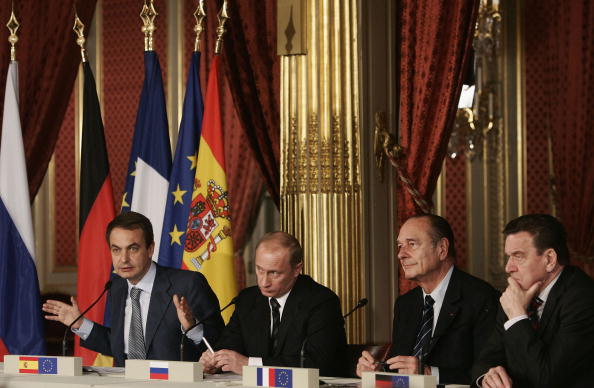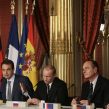
KREMLIN ENVOY SAYS BRUSSELS IS A DIFFICULT PARTNER
Publication: Eurasia Daily Monitor Volume: 2 Issue: 147
By:

On July 25, Russian President Vladimir Putin appointed veteran diplomat Vladimir Chizhov to be Russia’s permanent representative at the European Union. Assessing his new role, the Kremlin envoy conceded that the recently expanded EU had become a tougher partner for Moscow. But Chizhov himself is known for his tough stance in defending what the Kremlin regards as Russia’s national interests — particularly, vis-à-vis the EU’s new entrants from Eastern Europe. His appointment appears to be a signal that Russia has chosen to pursue an “uncompromising” line with the EU at a time when the rich bloc is going through particularly turbulent times.
Chizhov, 51, has been deputy foreign minister in charge of European affairs since 2002. His current position in Brussels was held, until March 2004, by Mikhail Fradkov, whom Putin made Russia’s prime minister just before his election to a second presidential term. The EU post had remained vacant after Fradkov moved from Brussels to Moscow.
In his first exclusive interview in his new capacity, Chizhov openly acknowledged that the sweeping expansion of the EU in 2004 had seriously complicated the relationship between Moscow and Brussels (Vremya novostei, July 26). For Chizhov, the main spoiler is the “New Europe,” to borrow the term coined by the U.S. Defense Secretary Donald Rumsfeld to describe the new arrivals from the former Soviet satellites in East-Central Europe and the Baltics. Moscow, the Russian diplomat said, had repeatedly warned the “old EU of the 15” about the possible complications that might arise should “our former co-nationals” and allies join the Western bloc. Remarkably the Kremlin, according to Chizhov, hoped that the “beneficial impact of old European traditions” would emerge and “positively influence” the East European novices. But this, unfortunately, has not come to pass.
Chizhov then turned to the thorny issue of Russia’s border treaties with Estonia and Latvia. From his perspective the prospects of ratifying the two treaties are “equally unpromising” at present. Riga and Tallinn, he asserted, “have actually been following the same path save for some slight variations.” The Kremlin has likely decided to put the border agreements with the two “intransigent” Baltic nations on the back burner. As for the EU’s further enlargement, the Russian diplomat suggested, in a tellingly displeased manner, that despite the current crisis, the bloc would likely continue to expand, although “in a much less massive way.”
The interview with the new Kremlin envoy to the EU appears to neatly reflect the Russian political elites’ current attitude toward the powerful bloc.
Most Russian policymakers and analysts characterize the Russia-EU relationship as a “fuzzy partnership,” as one Kremlin-connected commentator recently put it. Brussels, most Russian experts agree, is a “very difficult partner with whom it is very hard to do business.”
There is a growing conviction in Moscow that Russia, being the largest European state, simply cannot fit into the EU. As some Russian political thinkers point out, Russia is “too big and too peculiar” to be successfully integrated into the existing bloc.
Other commentators argue that EU membership should not even be a strategic goal for Russia, as the present-day EU is not an attractive organization but rather a “zone of economic stagnation.” Due to excessive bureaucratization, the argument goes, United Europe currently has one of the slowest development rates in the world. Most Russian politicians and entrepreneurs deem the elaborate norms and regulations that Brussels tirelessly imposes as “too socialist,” according to at least one Moscow analyst.
Thus, there is a clear asymmetry of interests between Russia and the EU. As it is seen from Moscow, the two sides want different things from each other. Europe is mainly interested in Russia’s political development as a participatory democracy and law-governed state; in securing an uninterrupted supply of energy resources; and in having a free hand in the enormous Russian market. For its part, Russia’s priorities include access to closed European markets and newest technologies, as well as to the EU’s abundant financial resources. At the same time, the Kremlin has grown visibly annoyed with European lectures on human rights and democratic values. “As far as democracy is concerned, Russians are tired of being Europe’s whipping boys,” former Soviet President Mikhail Gorbachev and Russian lawmaker Alexander Lebedev recently noted (Financial Times, July 26).
Finally, there is the sticky issue of the EU’s eastward enlargement. Most Russian analysts argue that the EU’s current crisis demonstrates that the bloc has run out of steam and should take a more realistic look at the pace of the integration process. This perspective may well be shared by the majorities among the citizenry and policymakers in a number of the EU member states. But the dominant view in Brussels is that enlargement must go on. At the same time, some European strategists assert, Russia should get used to the idea that “it is now merely a part of this wider European neighborhood too,” and that “its dominance in this region is effectively over.”
(Kreml.org, July 13; Nezavisimaya gazeta, July 15; Tribuna, July 19; Vremya novostei, July 26; Financial Times, July 26, 28; Politcom.ru, July 28)




